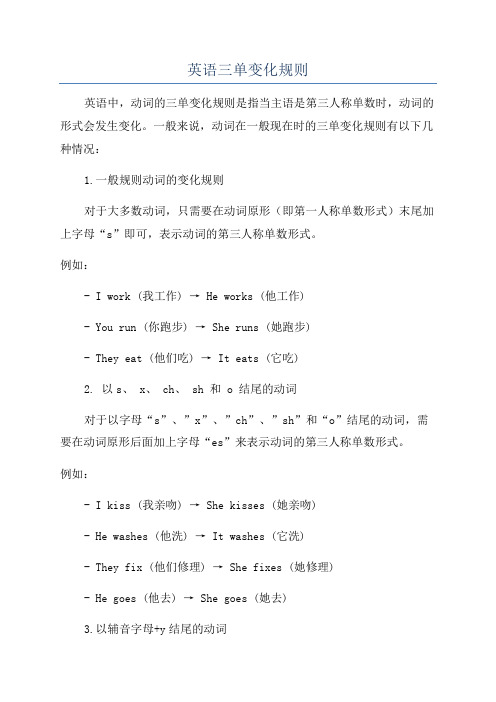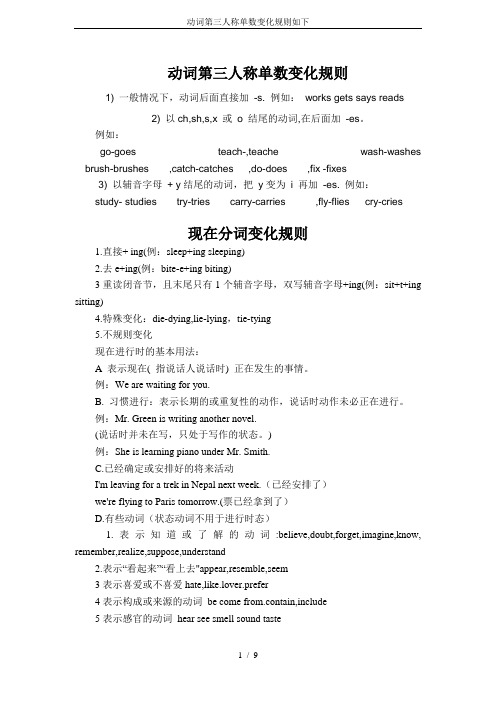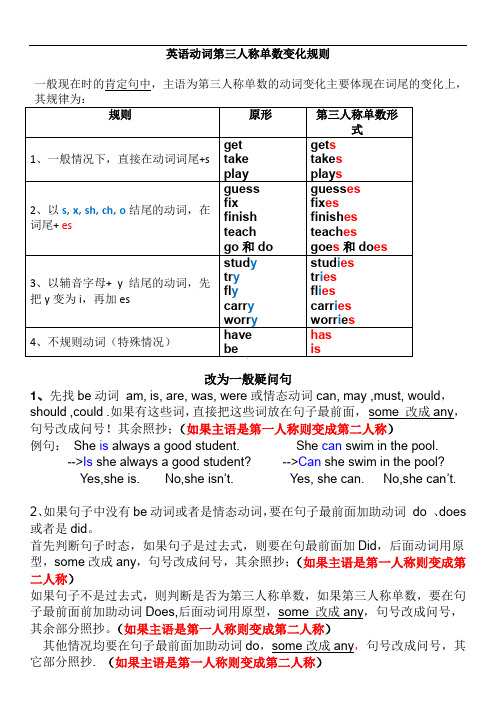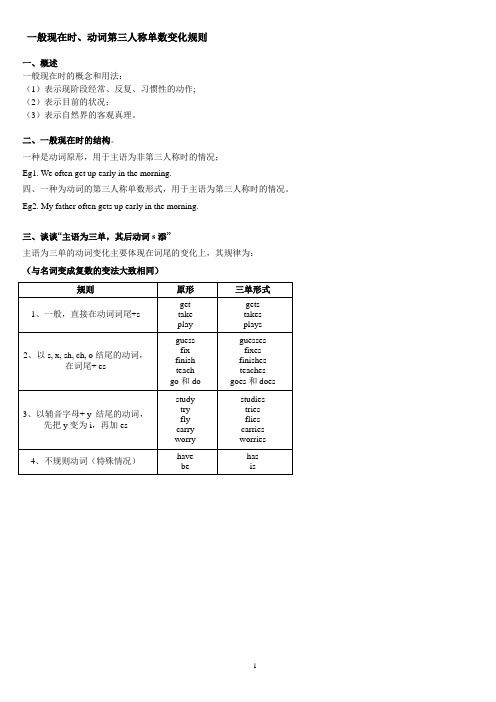(完整版)一般现在时动词第三人称单数变化规则
英语三单变化规则

英语三单变化规则英语中,动词的三单变化规则是指当主语是第三人称单数时,动词的形式会发生变化。
一般来说,动词在一般现在时的三单变化规则有以下几种情况:1.一般规则动词的变化规则对于大多数动词,只需要在动词原形(即第一人称单数形式)末尾加上字母“s”即可,表示动词的第三人称单数形式。
例如:- I work (我工作) → He works (他工作)- You run (你跑步) → She runs (她跑步)- They eat (他们吃) → It eats (它吃)2. 以s、 x、 ch、 sh 和 o 结尾的动词对于以字母“s”、”x”、”ch”、”sh”和“o”结尾的动词,需要在动词原形后面加上字母“es”来表示动词的第三人称单数形式。
例如:- I kiss (我亲吻) → She kisses (她亲吻)- He washes (他洗) → It washes (它洗)- They fix (他们修理) → She fixes (她修理)- He goes (他去) → She goes (她去)3.以辅音字母+y结尾的动词对于以辅音字母“y”结尾的动词,需要将“y”变为“i”,并加上字母“es”来表示动词的第三人称单数形式。
例如:- I study (我学习) → He studies (他学习)- You fly (你飞) → She flies (她飞)- They try (他们尝试) → It tries (它尝试)4.以“o”结尾的动词对于以字母“o”结尾的动词,一般来说,需要在动词原形后面加上字母“es”来表示动词的第三人称单数形式。
例如:- I do (我做) → He does (他做)- You go (你去) → She go es (她去)- They have (他们有) → It has (它有)5.不规则动词除了以上的规则动词之外,还有一些动词的第三人称单数形式是不规则的,需要记住其具体形式。
一般现在时动词第三人称单数变化规则

一.概述一般如今时的概念和用法:(1)暗示现阶段经常.重复.习惯性的动作;(2)暗示今朝的状态;(3)暗示天然界的客不雅真谛.二.一般如今时的构造时态的构造指的是动词的变更情势.一般如今时光有两种构造,一种是动词本相,用于主语为非第三人称时的情形;另一种为动词的第三人称单数情势,用于主语为第三人称时的情形.Eg1.We often get up early in the morning.Eg2.My father often gets up early in the morning.三.谈谈“主语为三单,厥后动词s添”在一般如今时中,当主语为第三人称单数时,谓语动词要用第三人称单数情势.可以简略论述为“主语为三单,厥后动词s添”.何谓第三人称单数?用一句话归纳综合就是“非你.非我.非复数”,如he, she, it, my father, my mother, my sister, ourEnglish teacher, Tom, Mike, Liu Jia, China, my book, etc.Eg3.He sometimes goes to school by bike.Eg4.My father works in the hospital asa doctor.四、一般如今时的确定句中,主语为第三人称单数的动词变更重要表如今词尾的变更上,其纪律为:(与名词变成复数的变法大致雷同.)五.一般如今时的句子转换(1)当句子中有be动词或情态动词时,则把be动词或情态动词(can,could等等)提到主语的前面变成一般疑问句;在be动词或情态动词后面加not变成否认句.例:①陈述句:She is a student.一般疑问句→ Is she a student?否认句→ She is not a student.②陈述句:I can swim.一般疑问句→ Can you swim否认句→ I can not swim.(2)当句子中即没有be动词,也没有情态动词时,则在主语前加助动词do (you,以及复数), does(单数she,he,it)变成一般疑问句;在主语后谓语动词前加助动词don’t(I,you,以及复数), doesn’t(单数she,he,it)变成否认句,助动词后的动词要变成动词本相.例:①陈述句:We get up at 7:00 every morning.一般疑问句→Do you get up at 7:00 every morning?否认句→We don’t get up at 7:00 every morning.②陈述句:She has a little brother.一般疑问句→ Does she have a little brother?否认句→ She doesn’t have a little brother.哪些主语是第三人称单数?1、人称代词he, she, it;如:He likes watching TV. 他爱好看电视.She has lunch at twelve. 她十二点吃午餐.It looks like a cat. 它看起来像只猫.2.单小我名.地名或称呼作主语;是第三人称单数.如:Han Mei looks like her mother. 韩梅看起来像她的母亲.Beijing is in China. 北京在中国.Uncle Wang often makes cakes. 王叔叔经常做蛋糕.3.单数可数名词或this / that / the + 单数可数名词作主语时,是第三人称单数;A horse is a useful animal. 马是有效的动物.This book is yours. 这本书是你的.That car is red. 那辆小汽车是红色的.The cat is Lucy's. 只猫是露茜的.4.不成数名词作主语时为第三人称单数.如:The milk is in the glass.牛奶在玻璃杯里.The bread is very small. 那面包很小.The water is very cold. 那些水很凉.1.写出下列动词的第三人称单数.drink ________ go _______ stay ________ make ________ look_________have_______ pass_______ carry _______ come________watch________plant_______ fly ________ study_______ brush________teach________catch_________ wash___________do________ like________ say_______ learn ___________eat___________ read___________ sing___________buy__________study_______ come__________plant(栽种)______2.用括号内动词的恰当情势填空.1. He often ________(have) dinner at home.2. We _____________ (not watch) TV on Monday.3. Nick ___________ (not go) to the zoo on Sunday.4. ________ they __________ (like) the World Cup?5. What _________they often _________ (do) on Saturdays?6. _________ your parents _________ (read) newspapers every day?7. There ________(be) some water in the bottle.8. My aunt _______(look) after her baby carefully.9. The child often _______(watch) TV in the evening.10. Mike’s sister ________ (cook) nice food. I _______ (like) eatingit very much.11. _______ (do) your brother_______ (watch) TV in the evening? No,he_______ (not).12. We often___________(play) in the playground.13. He _________(get) up at six o’clock.14.__________you_________(brush) your teeth every morning.15. What________ (do) he usually______ (do) after school?16.Danny_______(study)English,Chinese,Maths,Science and Art at school.17. Mike sometimes __________(go) to the park with his sister.18. At eight at night, she often__________(watch) TV with his parents.19. ________ Mike________(read) English every day?20.How many lessons_________your classmate________(have) on Monday?21. What time_________his mother_________(do) the housework?1.We _____________ ( go ) to school on foot every day .2.They ______________( not have ) any lessons on Sundays .3.She _____________ ( brush ) her teeth twice a day .4.These students ____________ ( be not ) good at boating .5.Wei Hua always ____________( carry ) water for his grandpa on Sundays .6.___________Kate ____________( like ) making friends ?7.The lazy boy ______________( not do ) his homework in the evening .8.How many classes _________you __________( have ) every day?9.Who __________the baby ___________( look ) like ?10.He can ___________( teach ) us Enlgish well .11. He often ________(have) dinner at home.12. Daniel and Tommy _______(be) in Class One.13. Nick _________(not go) to the zoo on Sunday.14. What _______they often _______(do) on Saturdays?15. _______ your parents _______(read) newspapers every day?16. The girl ____________(teach) us English on Sundays.17. She and I ________(take) a walk together every evening.18. There ________(be) some water in the bottle.19. They _______(have) the same hobby.20. My aunt __________(look) after her baby carefully.21. You always _______(do) your homework well.22. I _______(be) ill. I’m staying in bed.23. She _______(go) to school from Monday to Friday.24. The child often ____________(watch) TV in the evening.25.What day _______(be) it today? -It’s Saturday.26. He _________ (get) up at six o'clock.( )1. I ________to school at 7:00 in the morning.A. goB. goingC. goes( )2. They _______books every day in the library.A.readsB. readC. reading( )3. The monkey________ eating bananas very much.A.likeB. likesC. liking( )4. My father ________to read newspaper after supper every day. A.like B. likes C. liking( )5. I like watching TV, but my mother _________like it.A. d on’tB. doesn’tC. does( )6. ____________ your father drink milk every day?A.doB. areC. does( )7. We will go shopping if it____ tomorrow.A.don't rainB. didn't rainC.doesn't rainD. isn't rain( )8. He said the sun ____in the east and ____in the west.A rose; setB rises; setsC rises, setD rise; sets( )9.Wang Mei ____ music and often ____ to music.A like; listenB likes; listensC like; are listeningD liking ; listen( )10. Jenny____ English every evening.A has studyB studiesC studyD studied3.选出准确的答案:1. She (like / likes) to play football.2. He (like / likes) drinking milk.3. I (like / likes) to watch TV.4. We (like / likes) to play badminton.5. They (like / likes) to sing songs.6. She (read / reads) books every day.7. He (play / plays) computer games every day.8. It (listen / listens) to the radio every day.9. Linda (draw / draws) pictures every day.10. Jane and Linda (play / plays) football every day.5.把下列句子变成否认句:1. We like playing football.2. Linda swims every day.3. They like playing games.4. My father reads newspaper in the evening.7.把下列句子变成疑问句,并做确定和否认答复.1. My brother can ride a horse.2. We clean the classroom after school.___________________________________________________________。
(完整版)小学英语一般现在时三单动词的变化规则及练习题

一般现在时三单动词的变化规则及练习题1.一般情况下,直接加-s 2.以s. x. sh. ch. o结尾,加-es 3.以“辅音字母+y”结尾,变y为i,再加-es一、写出下列动词的第三人称单数drink ________ go _______ stay ________ make ________ look _________ have_______ pass_______ carry ____ come________ watch______sing_______ fly ________ study_______ brush________ do_________ teach_______二、用括号内动词的适当形式填空。
1. He often ________(have) dinner at home.2. Daniel and Tommy_______(be) in Class One. 3. We _______(not watch) TV on Monday. 4. Nick _______(not go) to the zoo on Sunday.5. What _______they often _______(do) on Sundays?6. _______ your mother _______(read) newspapers every day?7. Mike _______(like) cooking. 8. I _______(be) ill. I’m in bed. 9. Liu Tao _______(do) not like PE. 10. The child often_______(watch) TV in the evening.三、按照要求改写句子1. He watches TV every evening.(改为否定句)___________________________________________________2. I do my homework every day.(改为一般疑问句,作否定回答) ________________________________________________3. She likes books.(改为一般疑问句,做肯定回答)_______________________________________________________4. Amy likes playing computer games.(改为一般疑问句,作否定回答)________________________________________________________5. We go to school on Sundays.(改为否定句)_______________________________________________________四、改错(划出错误的地方,将正确的写在横线上)1. Is your brother like English? __________________2. Does he likes swimming? __________________3. He likes play games. __________________4. Shedon’tdo her homework on Sundays. _________________五、把句子补充完整。
动词第三人称单数变化规则如下

动词第三人称单数变化规则1) 一般情况下,动词后面直接加-s. 例如:works gets says reads2) 以ch,sh,s,x 或o 结尾的动词,在后面加-es。
例如:go-goes teach-,teache wash-washes brush-brushes ,catch-catches ,do-does ,fix -fixes3) 以辅音字母+ y结尾的动词,把y变为i 再加-es. 例如:study- studies try-tries carry-carries ,fly-flies cry-cries现在分词变化规则1.直接+ ing(例:sleep+ing sleeping)2.去e+ing(例:bite-e+ing biting)3重读闭音节,且末尾只有1个辅音字母,双写辅音字母+ing(例:sit+t+ing sitting)4.特殊变化:die-dying,lie-lying,tie-tying5.不规则变化现在进行时的基本用法:A 表示现在( 指说话人说话时) 正在发生的事情。
例:We are waiting for you.B. 习惯进行:表示长期的或重复性的动作,说话时动作未必正在进行。
例:Mr. Green is writing another novel.(说话时并未在写,只处于写作的状态。
)例:She is learning piano under Mr. Smith.C.已经确定或安排好的将来活动I'm leaving for a trek in Nepal next week.(已经安排了)we're flying to Paris tomorrow.(票已经拿到了)D.有些动词(状态动词不用于进行时态)1.表示知道或了解的动词:believe,doubt,forget,imagine,know, remember,realize,suppose,understand2.表示“看起来”“看上去"appear,resemble,seem3表示喜爱或不喜爱hate,like.lover.prefer4表示构成或来源的动词be come from.contain,include5表示感官的动词hear see smell sound taste6表示拥有的动词belong to.need.own .possess.want wish1、现在进行时的构成现在进行时由"be+v-ing"构成。
第三人称单数及动词第三人称单数形式变化规则(附练习及答案)(可打印修改)

第三人称单数及动词第三人称单数形式变化规则Ⅰ. 第三人称单数主语归纳在一般现在时中,当主语是第三人称单数时,谓语动词要用第三人称单数形式,即常在动词原形后加-s或-es。
现将第三人称单数主语归纳总结如下:一、人称代词he, she, it是第三人称单数1. He likes cars. 他喜欢车。
2. She goes to school at seven. 她七点去上学。
3. It has a good name. 它有一个好名字。
二、单个人名、地名或亲朋好友等称呼作主语,是第三人称单数1. Lucy never throws rubbish on the floor. Pat从不在地板上扔垃圾。
2. Beijing is in China. 北京在中国。
3. Aunt Mary usually makes cakes. 玛丽阿姨经常做蛋糕。
三、单数可数名词作主语时,是第三人称单数。
1. A horse is a useful animal. 马是有用的动物。
2. This book is yours. 这本书是你的。
3. That car is red. 那辆小汽车是红色的。
四、不定代词someone, somebody, nobody, everything, something及指示代词this, that作主语时,是第三人称单数1. Everyone is here. 大家到齐了。
2. This is a pen. 这是一支钢笔。
3. That is an eraser. 那是一块橡皮擦。
五、不可数名词作主语时为第三人称单数。
1. The milk is in the glass. 牛奶在玻璃杯里。
2. The bread is very small. 那面包很小。
六、当数字或字母作主语时,看作第三人称单数1. "6" is a lucky number. "6"是个吉利数字。
动词第三人称单数变化规则 笔记

英语动词第三人称单数变化规则一般现在时的肯定句中,主语为第三人称单数的动词变化主要体现在词尾的变化上,改为一般疑问句1、先找be动词am, is, are, was, were或情态动词can, may ,must, would,should ,could .如果有这些词,直接把这些词放在句子最前面,some 改成any,句号改成问号!其余照抄;(如果主语是第一人称则变成第二人称)例句:She is always a good student. She can swim in the pool.-->Is she always a good student? -->Can she swim in the pool?Yes,she is. No,she isn’t. Yes, she can. No,she can’t.2、如果句子中没有be动词或者是情态动词,要在句子最前面加助动词do 、does 或者是did。
首先判断句子时态,如果句子是过去式,则要在句最前面加Did,后面动词用原型,some改成any,句号改成问号,其余照抄;(如果主语是第一人称则变成第二人称)如果句子不是过去式,则判断是否为第三人称单数,如果第三人称单数,要在句子最前面前加助动词Does,后面动词用原型,some 改成any,句号改成问号,其余部分照抄。
(如果主语是第一人称则变成第二人称)其他情况均要在句子最前面加助动词do,some改成any,句号改成问号,其它部分照抄.(如果主语是第一人称则变成第二人称)2、变一般疑问句:把含有动词第三人称单数形式的变成一般疑问句时,要借用助动词does,如:She goes home at five every day.→Does she go home at five every day?--- Yes, she does. No, she doesn’t.改为否定句1、先找be动词am, is, are, was, were或情态动词can, may ,must, would,should ,could .如果有这些词,直接在这些词的后面加not,some 改成any,其余照抄;2、如果句子中没有be动词或者是情态动词,要在动词前面加don’t 、doesn’t 或者是didn’t。
【高中英语】高中英语知识点:动词的第三人称单数

【高中英语】高中英语知识点:动词的第三人称单数动词第三人称单数的概念:在一般现在时中,当主语是第三人称单数时,谓语动词要用第三人称单数形式,即常在动词原形后加-s或-es。
动词第三人称单数的变化规则:在一般现在时的句子中,当主语是第三人称单数时,动词要发生变化。
通常现在时的肯定句中,主语为第三人称单数的动词变化主要彰显在词尾的变化上,其规律大体存有三点:1、一般情况下,直接在动词词尾+s,例如:get→gets;take→takes2、以s,sh,ch,x,o结尾的动词,在词尾+es,比如:teach→teaches;fix→fixes;go→goes3、以辅音字母+y结尾的动词,变y为i,再+es,如:study→studies;try→tries除上述规律外,还应当特别注意下面三点:1、动词have,遇到主语是第三人称单数时,要用has;动词be的第三人称单数形式是is。
2、所含动词第三人称单数形式的句子变小否定句时,会用doesn't+动词原形:如:hegoestoschoolatsixinthemorning.(变否定句)→hedoesn'tgotoschoolatsixinthemorning.3、对含有动词第三人称单数形式的句子提问时,要用助动词does:例如:shegoeshomeatfiveeveryday.(对划线部分回答)→when/whattimedoesshegohomeeveryday?综上所述,只要我们洞察了英语动词第三人称单数形式的变化规则,在通常现在时的句子中,我们都能够从容应对,客随主“变小”了。
动词第三人称单数的用法:在通常现在时中,当主语就是第三人称单数时,谓语动词必须用第三人称单数形式,即常在动词原形后提-s或-es。
现概括总结如下:一、人称代词he,she,it是第三人称单数。
例如:helikeswatchingtv.他讨厌玩游戏。
shehaslunchattwelve.她十二点吃午餐。
一般现在时动词第三人称单数变化规则

一、概述一般现在时的概念和用法:(1)表示现阶段经常、反复、习惯性的动作;(2)表示目前的状况;(3)表示自然界的客观真理。
二、一般现在时的结构。
一种是动词原形,用于主语为非第三人称时的情况;Eg1. We often get up early in the morning.四、一种为动词的第三人称单数形式,用于主语为第三人称时的情况。
Eg2. My father often gets up early in the morning.三、谈谈“主语为三单,其后动词s添”主语为三单的动词变化主要体现在词尾的变化上,其规律为:(与名词变成复数的变法大致相同)四、一般现在时的句子转换(1)、当句子中有be、情态动词时,则把be、情态动词(can,could等等)提到主语的前面变成一般疑问句;在be动词或情态动词后面加not变成否定句. 例:①陈述句:She is a student.一般疑问句→ Is she a student?否定句→ She is not a student.②陈述句:I can swim.一般疑问句→ Can you swim否定句→ I can not swim.(2)当句子中即没有be动词,也没有情态动词时,则在主语前加助动词do (you,以及复数), does(单数she,he,it)变成一般疑问句;在主语后谓语动词前加助动词don’t(I,you,以及复数), doesn’t(单数she,he,it)变成否定句,助动词后的动词要变成动词原形。
例:①陈述句:We get up at 7:00 every morning.一般疑问句→Do you get up at 7:00 every morning?否定句→We don’t get up at 7:00 every morning.②陈述句:She has a little brother.一般疑问句→ Does she have a little brother?否定句→ She doesn’t have a little brother.五、哪些主语是第三人称单数?1、人称代词he, she, it;如:He likes watching TV. 他喜欢看电视。
- 1、下载文档前请自行甄别文档内容的完整性,平台不提供额外的编辑、内容补充、找答案等附加服务。
- 2、"仅部分预览"的文档,不可在线预览部分如存在完整性等问题,可反馈申请退款(可完整预览的文档不适用该条件!)。
- 3、如文档侵犯您的权益,请联系客服反馈,我们会尽快为您处理(人工客服工作时间:9:00-18:30)。
一、概述 一般现在时的概念和用法: (1)表示现阶段经常、反复、习惯性的动作; (2)表示目前的状况; (3)表示自然界的客观真理。 二、一般现在时的结构
时态的结构指的是动词的变化形式。一般现在时间有两种结构,一种是动词原形,用于主语为非第三人称时的情况;另一种为动词的第三人称单数形式,用于主语为第三人称时的情况。 Eg1. We often get up early in the morning. Eg2. My father often gets up early in the morning. 三、谈谈“主语为三单,其后动词s添” 在一般现在时中,当主语为第三人称单数时,谓语动词要用第三人称单数形式。可以简单叙述为“主语为三单,其后动词s添”。何谓第三人称单数?用一句话概括就是“非你、非我、非复数”,如he, she, it, my father, my mother, my sister, our English teacher, Tom, Mike, Liu Jia, China, my book, etc. Eg3.He sometimes goes to school by bike. Eg4.My father works in the hospital as a doctor.
四、一般现在时的肯定句中,主语为第三人称单数的动词变化主要体现在词尾的变化上,其规律为: (与名词变成复数的变法大致相同。) 规则 原形 第三人称单数形式
1、一般情况下,直接在动词词尾+s get take play gets takes plays
2、以s, x, sh, ch, o结尾的动词,在词尾+ es
guess fix finish teach go和do guesses fixes finishes teaches goes和does
3、以辅音字母+ y 结尾的动词,先把y变为i,再加es
study try fly carry worry studies tries flies carries worries
4、不规则动词(特殊情况) have be has is
五、一般现在时的句子转换 (1)当句子中有be动词或情态动词时,则把be动词或情态动词(can,could等等)提到主语的前面变成一般疑问句;在be动词或情态动词后面加not变成否定句.例: ①陈述句:She is a student. 一般疑问句→ Is she a student? 否定句→ She is not a student. ②陈述句:I can swim. 一般疑问句→ Can you swim 否定句→ I can not swim. (2)当句子中即没有be动词,也没有情态动词时,则在主语前加助动词do (you,以及复数), does(单数she,he,it)变成一般疑问句;在主语后谓语动词前加助动词don’t(I,you,以及复数), doesn’t(单数she,he,it)变成否定句,助动词后的动词要变成动词原形。例: ①陈述句:We get up at 7:00 every morning. 一般疑问句→Do you get up at 7:00 every morning? 否定句→We don’t get up at 7:00 every morning. ②陈述句:She has a little brother. 一般疑问句→ Does she have a little brother? 否定句→ She doesn’t have a little brother.
哪些主语是第三人称单数? 1、人称代词he, she, it; 如:He likes watching TV. 他喜欢看电视。 She has lunch at twelve. 她十二点吃午餐。 It looks like a cat. 它看起来像只猫。 2、单个人名、地名或称呼作主语;是第三人称单数。如: Han Mei looks like her mother. 韩梅看起来像她的母亲。 Beijing is in China. 北京在中国。 Uncle Wang often makes cakes. 王叔叔经常做蛋糕。 3、单数可数名词或this / that / the + 单数可数名词作主语时,是第三人称单数; A horse is a useful animal. 马是有用的动物。 This book is yours. 这本书是你的。 That car is red. 那辆小汽车是红色的。 The cat is Lucy's. 只猫是露茜的。 4、不可数名词作主语时为第三人称单数。如: The milk is in the glass.牛奶在玻璃杯里。 The bread is very small. 那面包很小。 The water is very cold. 那些水很凉。
1、写出下列动词的第三人称单数。 drink ________ go _______ stay ________ make ________ look _________ have_______ pass_______ carry _______ come________ watch________ plant_______ fly ________ study_______ brush________ teach________ catch_________ wash___________do________ like________ say_______ learn ___________eat___________ read___________ sing___________ buy__________ study_______ come__________plant(种植)______
2、用括号内动词的适当形式填空。 1. He often ________(have) dinner at home. 2. We _____________ (not watch) TV on Monday. 3. Nick ___________ (not go) to the zoo on Sunday. 4. ________ they __________ (like) the World Cup? 5. What _________they often _________ (do) on Saturdays? 6. _________ your parents _________ (read) newspapers every day? 7. There ________(be) some water in the bottle. 8. My aunt _______(look) after her baby carefully. 9. The child often _______(watch) TV in the evening. 10. Mike’s sister ________ (cook) nice food. I _______ (like) eating it very much. 11. _______ (do) your brother_______ (watch) TV in the evening? No, he_______ (not). 12. We often___________(play) in the playground. 13. He _________(get) up at six o’clock. 14.__________you_________(brush) your teeth every morning. 15. What________ (do) he usually______ (do) after school? 16.Danny_______(study)English,Chinese,Maths,Science and Art at school. 17. Mike sometimes __________(go) to the park with his sister. 18. At eight at night, she often__________(watch) TV with his parents. 19. ________ Mike________(read) English every day? 20.How many lessons_________your classmate________(have) on Monday? 21. What time_________his mother_________(do) the housework? 1.We _____________ ( go ) to school on foot every day . 2.They ______________( not have ) any lessons on Sundays . 3.She _____________ ( brush ) her teeth twice a day . 4.These students ____________ ( be not ) good at boating . 5.Wei Hua always ____________( carry ) water for his grandpa on Sundays . 6.___________Kate ____________( like ) making friends ? 7.The lazy boy ______________( not do ) his homework in the evening . 8.How many classes _________you __________( have ) every day? 9.Who __________the baby ___________( look ) like ? 10.He can ___________( teach ) us Enlgish well . 11. He often ________(have) dinner at home. 12. Daniel and Tommy _______(be) in Class One. 13. Nick _________(not go) to the zoo on Sunday. 14. What _______they often _______(do) on Saturdays? 15. _______ your parents _______(read) newspapers every day? 16. The girl ____________(teach) us English on Sundays. 17. She and I ________(take) a walk together every evening. 18. There ________(be) some water in the bottle. 19. They _______(have) the same hobby. 20. My aunt __________(look) after her baby carefully. 21. You always _______(do) your homework well. 22. I _______(be) ill. I’m staying in bed. 23. She _______(go) to school from Monday to Friday. 24. The child often ____________(watch) TV in the evening. 25.-What day _______(be) it today? - It’s Saturday. 26. He _________ (get) up at six o'clock. ( )1. I ________to school at 7:00 in the morning. A. go B. going C. goes ( )2. They _______books every day in the library. A.reads B. read C. reading ( )3. The monkey________ eating bananas very much. A.like B. likes C. liking ( )4. My father ________to read newspaper after supper every day. A.like B. likes C. liking ( )5. I like watching TV, but my mother _________like it.
